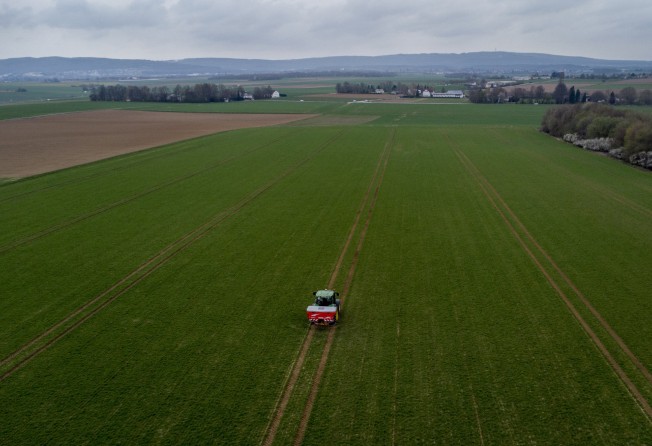Ukraine war: Russian invasion worsens fertiliser crunch, risking global food supplies
- Higher fertiliser prices are making the world’s food supply more expensive and less abundant, as farmers skimp on nutrients for crops and get lower yields
- Squeeze on food supplies will have greater affect on poorer countries, and comes as March’s world food-price index reached its highest level since it started in 1990

Russia is a huge exporter of fertiliser that farmers worldwide need to cultivate their crops. As the war in Ukraine has endangered supplies and raised prices for both fertiliser and energy, the crunch is affecting farmers’ ability to do their job.
Higher fertiliser prices are making the world’s food supply more expensive and less abundant, as farmers skimp on nutrients for their crops and get lower yields. While the ripples will be felt by grocery shoppers in wealthy countries, the squeeze on food supplies will land hardest on families in poorer countries. It could hardly come at a worse time: The UN Food and Agriculture Organization said last week that its world food-price index in March reached the highest level since it started in 1990.
The fertiliser crunch threatens to further limit worldwide food supplies, already constrained by the disruption of crucial grain shipments from Ukraine and Russia. The loss of those affordable supplies of wheat, barley and other grains raises the prospect of food shortages and political instability in Middle Eastern, African and some Asian countries where millions rely on subsidised bread and cheap noodles.
“Food prices will skyrocket because farmers will have to make profit, so what happens to consumers?’’ said Uche Anyanwu, an agricultural expert at the University of Nigeria.
The aid group Action Aid warns that families in the Horn of Africa are already being driven “to the brink of survival.’’
The UN says Russia is the world’s No. 1 exporter of nitrogen fertiliser and No. 2 in phosphorus and potassium fertilisers. Its ally Belarus, also contending with Western sanctions, is another major fertiliser producer.
Many developing countries – including Mongolia, Honduras, Cameroon, Ghana, Senegal, Mexico and Guatemala – rely on Russia for at least a fifth of their imports.
The conflict also has driven up the already-exorbitant price of natural gas, used to make nitrogen fertiliser. The result: European energy prices so high that some fertiliser companies “have closed their businesses and stopped operating their plants,’’ said David Laborde, a researcher at the International Food Policy Research Institute.
For corn and cabbage farmer Jackson Koeth, 55, of Eldoret in western Kenya, the conflict in Ukraine was distant and puzzling until he had to decide whether to go ahead with the planting season. Fertiliser prices had doubled from last year.
Koeth said he decided to keep planting but only on half the acreage of years past. Yet he doubts he can make a profit with fertiliser so costly.
In China, the price of potash – potassium-rich salt used as fertiliser – is up 86 per cent from a year earlier. Nitrogen fertiliser prices have climbed 39 per cent and phosphorus fertiliser is up 10 per cent.
In the eastern Chinese city of Tai’an, the manager of a 35-family cooperative that raises wheat and corn said fertiliser prices have jumped 40 per cent since the start of the year.
“We can hardly make any money,” said the manager, who would give only his surname, Zhao.
Terry Farms, which grows produce on 2,100 acres largely in Ventura, California, has seen prices of some fertiliser formulations double; others are up 20 per cent. Shifting fertilisers is risky, vice-president William Terry said, because cheaper versions might not give “the crop what it needs as a food source.’’
As the growing season approaches in Maine, potato farmers are grappling with a 70 per cent to 100 per cent increase in fertiliser prices from last year, depending on the blend.
“I think it’s going to be a pretty expensive crop, no matter what you’re putting in the ground, from fertiliser to fuel, labour, electrical and everything else,” said Donald Flannery, executive director of the Maine Potato Board.
In Prudentopolis, a town in Brazil’s Parana state, farmer Edimilson Rickli showed off a warehouse that would normally be packed with fertiliser bags but has only enough to last a few more weeks. He is worried that, with the war in Ukraine showing no sign of letting up, he’ll have to go without fertiliser when he plants wheat, barley and oats next month.
“The question is: Where Brazil is going to buy more fertiliser from?” he said. “We have to find other markets.’’
Other countries are hoping to help fill the gaps. Nigeria, for example, opened Africa’s largest fertiliser factory last month, and the $2.5 billion plant has already shipped fertiliser to the United States, Brazil, India and Mexico.

India, meanwhile, is seeking more fertiliser imports from Israel, Oman, Canada and Saudi Arabia to make up for lost shipments from Russia and Belarus.
“If the supply shortage gets worse, we will produce less,” said Kishor Rungta of the non-profit Fertiliser Association of India. “That’s why we need to look for options to get more fertilisers in the country.”
Agricultural firms are providing support for farmers, especially in Africa where poverty often limits access to vital farm inputs. In Kenya, Apollo Agriculture is helping farmers get fertiliser and access to finance.
“Some farmers are skipping the planting season and others are going into some other ventures such as buying goats to cope,” said Benjamin Njenga, co-founder of the firm. “So these support services go a long way for them.”
Governments are helping, too. The US Department of Agriculture announced last month that it was issuing US$250 million in grants to support US fertiliser production. The Swiss government has released part of its nitrogen fertiliser reserves.
Still, there’s no easy answer to the double whammy of higher fertiliser prices and limited supplies. The next 12 to 18 months, food researcher LaBorde said, “will be difficult.’’